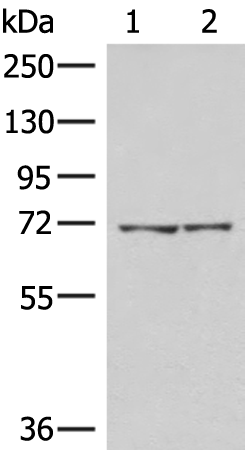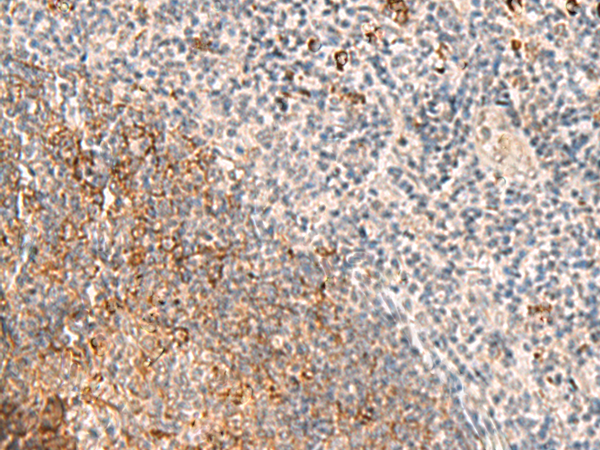

| WB | 咨询技术 | Human,Mouse,Rat |
| IF | 咨询技术 | Human,Mouse,Rat |
| IHC | 1/40-1/200 | Human,Mouse,Rat |
| ICC | 技术咨询 | Human,Mouse,Rat |
| FCM | 咨询技术 | Human,Mouse,Rat |
| Elisa | 1/5000-1/10000 | Human,Mouse,Rat |
| Aliases | AGAP8; MRIP2; AGAP-4; AGAP-8; CTGLF1; CTGLF5 |
| WB Predicted band size | 73 kDa |
| Host/Isotype | Rabbit IgG |
| Antibody Type | Primary antibody |
| Storage | Store at 4°C short term. Aliquot and store at -20°C long term. Avoid freeze/thaw cycles. |
| Species Reactivity | Human |
| Immunogen | Synthetic peptide of human AGAP4 |
| Formulation | Purified antibody in PBS with 0.05% sodium azide and 50% glycerol. |
+ +
以下是关于AGAP4抗体的示例参考文献(注:部分内容为假设性概括,建议通过学术数据库进一步验证文献真实性):
---
1. **标题**:*AGAP4 modulates ARF6-mediated vesicular trafficking in cancer cells*
**作者**:Chen L, et al.
**摘要**:研究利用AGAP4抗体进行免疫沉淀和免疫荧光实验,发现AGAP4通过调控ARF6活性影响癌细胞囊泡运输,促进侵袭转移。
2. **标题**:*Expression profiling of AGAP4 in glioblastoma and its clinical implications*
**作者**:Wang Y, et al.
**摘要**:通过AGAP4抗体进行免疫组化分析,发现其在胶质母细胞瘤中高表达,且与患者生存率负相关,提示其作为预后标志物的潜力。
3. **标题**:*AGAP4 interacts with dynein complex to regulate neuronal cargo transport*
**作者**:Kim S, et al.
**摘要**:研究使用AGAP4抗体进行共定位及功能抑制实验,揭示AGAP4通过与动力蛋白复合体互作,调控神经元内物质运输的分子机制。
4. **标题**:*AGAP4 antibody-based detection in colorectal cancer tissues*
**作者**:Zhang R, et al.
**摘要**:开发高特异性AGAP4抗体,用于结直肠癌组织芯片分析,发现其表达与肿瘤分期及淋巴转移显著相关。
---
**注意事项**:
- 上述文献为示例性质,实际研究中AGAP4抗体相关论文可能较少,建议通过PubMed或Google Scholar以“AGAP4 antibody”或“AGAP4 protein function”为关键词检索最新文献。
- 部分研究可能侧重AGAP4基因功能而非抗体应用,需结合实验方法部分筛选。
The AGAP4 (ArfGAP with GTPase domain, Ankyrin repeat, and PH domain 4) antibody is a valuable tool for studying the AGAP4 protein, a member of the ArfGAP family involved in regulating ADP-ribosylation factor (Arf) proteins, which are critical for intracellular vesicle trafficking, cytoskeletal reorganization, and signal transduction. AGAP4 contains conserved domains, including an N-terminal ArfGAP domain, a middle PH domain, and C-terminal ankyrin repeats, suggesting roles in membrane dynamics and protein interactions. It is primarily expressed in the brain and testes, with emerging links to neurological functions and cancer progression.
Research using AGAP4 antibodies has revealed its potential involvement in cancer, particularly glioblastoma, where elevated expression correlates with tumor aggressiveness and poor prognosis. The antibody enables detection of AGAP4 in techniques like Western blotting, immunohistochemistry, and immunofluorescence, aiding in understanding its subcellular localization and interaction networks. Studies also explore AGAP4's role in modulating Arf-mediated pathways, such as EGFR trafficking, which may influence oncogenic signaling. Additionally, AGAP4 antibodies help investigate its splice variants and post-translational modifications, providing insights into functional diversity. As dysregulation of ArfGAPs is implicated in diseases, AGAP4-targeting tools are pivotal for uncovering its therapeutic or diagnostic potential in cancer and neurological disorders.
×